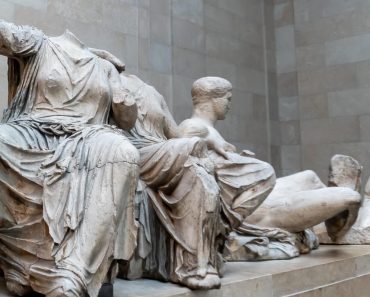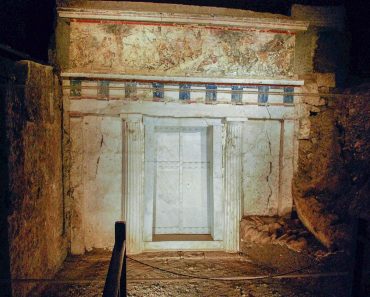As his powerful new documentary The Marbles opens in London cinemas, director David Wilkinson speaks to To Vima about the long and complex story of the Parthenon Marbles, his decades-long passion for the subject, and why he believes the tide is finally turning toward their return to Greece.
What inspired you to make this documentary about the marbles, and why now?
“I’ve been trying to make it for a very long time, since 2008. It just so happens that everything’s come together. But in 1976, I started to go to lectures that the British Museum gave at lunchtime. I was an actor, I was out of work, I didn’t have much money. They didn’t cost anything, and I really enjoyed them. But the only ones that triggered me and I was fascinated with were to do with ancient Greece. Nothing else really resonated with me. I don’t know why. And I just became semi-obsessed.”
He pauses. “Back in those days, almost fifty years ago, everybody said we owned them. Nobody ever questioned that they didn’t belong to us. I mean, we were Great Britain. We wouldn’t go steep in things. I was a very naive 20-year-old. And along the way, I started to discover the truth. The more I looked at it, the more it worried me. Nobody seemed to be very bothered in Britain. It’s not possible you’ve got stolen goods.”
When did you finally decide to make the film?
“It was some time before I decided to do it, and that was in 2008. But back then, nobody was interested. I couldn’t get any money, I couldn’t get any support or anything. And as one’s getting on in life, I thought, if I don’t make this soon, then I’m never going to make it. So without any money, I started making it on the 25th of March, 2021. I thought, what better day to make it? And I just kind of carried on.”
He laughs. “If I’d had that money, I would have completed it in 2022, possibly 2023. And it would have been a very different film. The lack of a budget for me has actually enhanced the film, because as time went on, more and more extraordinary things happened. I mean, who would have believed that people were stealing artefacts from the British Museum?”
Has making the film changed your own perspective on the issue?
“Yes. I cover things that no writer, either journalist or novelist, has come up with. I’ve come up with a very unique concept. And that’s to Scotland. Obviously, Lord Elgin, who is the one villain of the film, is Scottish. The country of his birth is actually, in my opinion, the world leader when it comes to the repatriation of dubious artefacts. My actor friend Brian Cox says in the film, ‘If Lord Elgin had put those marbles in a museum in Edinburgh, they would have gone back long ago.’ And I genuinely believe that.”
He adds: “You’ve got this strange pincer movement between what happens in Scotland with dubious artefacts and what happens in England. Of late, it’s not even really England, it’s London. Because if you look at the Manchester Museum, Sheffield Museum, even little museums in Exeter or Bristol, they’re doing the right thing – they’re saying, hang on, we acquired this illegally, we must give them back.”
You have described the removal of the marbles as ‘the greatest heist in our history’. Could you elaborate?
“Very simply, it is. I can’t say in the whole of history, but in modern times, yes. How do you put a value on the Parthenon marbles and the friezes? Hundreds of millions. If somebody will pay $100 million for one Van Gogh painting, what, collectively, is this worth? We’re talking billions. I cannot think of anything else in the history of civilisation that was taken from one country and sits in another. Nothing else is comparable.”
Your film claims to prove that the marbles were stolen. What evidence did you find during your research?
“It’s not a conclusion I have, it’s a conclusion that many people have. If you look at it all – at the time that Elgin brought the marbles over, the high society in the UK, there were a lot of people against it. They felt they should go back to Greece. The very wealthy used to love going to Greece on the grand tour, and they felt that Elgin was a despoiler. They were very angry with him.”
He explains further: “Suddenly, out of the blue, his secretary, who was also his priest, produced this Italian firman. And what’s extraordinary is, if you go to the Ottoman archives in Istanbul, they’re all numbered – and there isn’t one missing that deals with Elgin’s so-called acquisition. The British Museum’s firman is basic, in Italian, unlike the elaborate originals. Whichever way you look at it, it’s very hard to argue that this random firman is original. The Turks have come out and said there is no evidence whatsoever that the Ottoman Empire gave or sold to Lord Elgin the Parthenon Marbles.”
How did the British Museum react to the film?
“They have been extraordinarily complimentary. The British Museum have been very good to me. I don’t attack the Museum. I don’t have a problem with the Museum – I have a problem with some of the trustees. The people that work there care passionately about the marbles. There are people who think they should go back and people who think they should remain – just like society in general. But they went out of their way to make sure I got the best possible shots for the film.”
Are you optimistic about the ongoing negotiations between the British Museum and the Greek government?
“It’ll be less than ten years, I feel. What’s extraordinary is that suddenly, when George Osborne became chair, he was the first person in over 200 years to actually have a dialogue with Greece. That’s very positive. Ultimately, there will be some sort of loan that happens. I’m personally against the loan. How can you loan something you don’t own? It’s a term the Greek government does not accept. But somebody clever will come up with a phrase acceptable to both sides. And once they get back to Athens, they ain’t coming back. The Greeks would be mad to give them back.”
What challenges did you face in making the documentary?
“The biggest obstacle I had was the money. To make a film, if you don’t have money, you can’t make a film. I wanted to film in about twelve different countries, but I just had cameramen in Athens, China, and America. I never went there. That was the biggest challenge. I don’t want to antagonise those on the other side. Yes, I do only put the Greek side – and I say that’s the side I’m on – but I made it clear to try and have the other side as well. No one from the British Museum, no ex-trustee would appear on camera. But I’ve got Dominic Selwood, who puts their case, and that was really important.”
How has the audience reacted since the release?
“Well, it’s not just that. If you look, there’s a lot of people who say Britain should never apologise for slavery. But there’s a lot of us that say we must. We’re becoming a very divided society. Some think everything the Empire did was brilliant. I’ve spoken to people who think we should go back to the British Empire. That’s really strange – because one of the things the British Empire did was invade. But when those people that live there come over here, the very people that want to keep the marbles here don’t like those people coming here. We’re kind of schizophrenic, really. But at some point, we have to face our past. We did some wonderful things, but we did an awful lot that we should be ashamed of.”
Finally, when do you think we’ll see the marbles back in Athens?
“I just can’t answer that. I’m just optimistic. I think the mood music is changing. And I do think that if lots of people write to their MPs and say this is wrong, what I’d love to see is a poll next year where suddenly 85% of everybody says yes, they must go back. Because then that’s very difficult for those that say they must stay to argue against that. When has 15% been the majority?”
A British Museum spokesperson told TO VIMA: “Discussions with Greece about a Parthenon Partnership are on-going and constructive.”
“We believe that this kind of long term partnership would strike the right balance between sharing our greatest objects with audiences around the world, and maintaining the integrity of the incredible collection we hold at the museum.”
A UK Government spokesperson told TO VIMA: “We have no plans to change the law that would permit a permanent move of the Parthenon Sculptures. Decisions relating to the care and management of the museum’s collections, including loaning objects, are a matter for the Trustees of the British Museum. This position has been held consistently across different governments, including the last government.”







